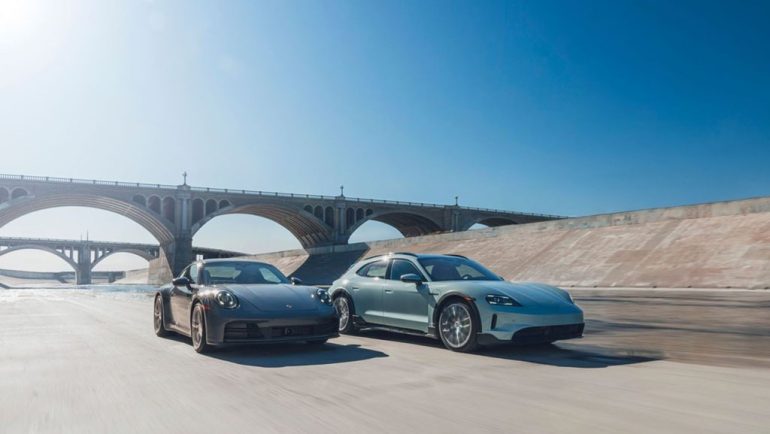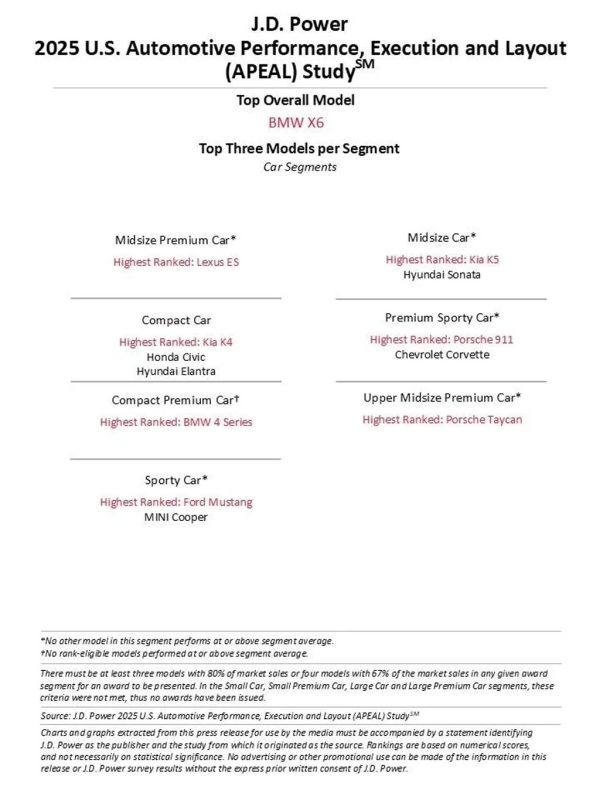
J.D. Power’s latest 2025 Automotive Performance, Execution and Layout (APEAL) Study is in, and it paints a pretty optimistic picture of how Americans feel about their new cars. Now in its 30th year, the APEAL Study has become a barometer for how emotionally connected new-vehicle owners feel about their purchases. This year’s report shows a notable uptick in satisfaction across the board, with every category improving for the first time in nearly a decade.
For the second year in a row, Porsche and Mini top the rankings in their respective Premium and Mass Market segments. Porsche’s enduring appeal with buyers lies in the brand’s holistic approach to performance, design, and luxury, while Mini continues to win hearts with its character-rich styling and playful driving dynamics. BMW also grabbed headlines with the X6 earning the top score among individual models, edging out last year’s winner, the 7 Series. While some might call the X6’s coupe-SUV silhouette polarizing, clearly its fans appreciate the bold design.

The APEAL Study is designed to measure a buyer’s satisfaction during the critical first 90 days of ownership. It doesn’t focus on problems or reliability issues, which are covered in other J.D. Power studies. Instead, it hones in on the emotional connection owners have with their vehicles, evaluating 37 distinct attributes ranging from performance and styling to comfort and usability.
A standout finding this year was the sharp increase in satisfaction with fuel economy. That metric saw a 13-point jump, the highest gain in any category. It’s a signal that automakers are hitting the mark when it comes to efficiency without compromising the overall ownership experience. Infotainment and interior design also saw respectable gains, each improving by six points, reflecting the growing importance of tech and tactile quality to modern buyers.

Among Premium brands, Land Rover, Jaguar, Rivian, and Tesla ranked high, suggesting their loyal followings are still very much engaged. Surprisingly, legacy luxury names like Audi, Lexus, Volvo, Acura, and Infiniti didn’t perform as well. Enthusiasm seems to be waning for models like the Audi Q5, a vehicle that arguably plays it a bit too safe in a segment filled with flashier alternatives.
In the Mass Market arena, Dodge and GMC followed closely behind Mini, showing strong emotional resonance with buyers. However, the competition here was much tighter, with less separation between brands. That tight grouping made some of the lower scorers more surprising, especially Mazda, Subaru, and Jeep. These are brands known for passionate followings, yet their scores suggest some owners may be underwhelmed. Infotainment quirks in Mazda and Subaru models could be one explanation, while Jeep’s focus on rugged, off-road utility might trade off some everyday comfort and refinement.

Another insight from this year’s study: vehicles in their first model year tend to score lower on emotional satisfaction. J.D. Power attributes this to early-stage tech bugs and system gremlins that often plague fresh redesigns. Buyers of carry-over models, on the other hand, appear to develop a stronger emotional bond, likely due to the predictability and polish of a known quantity.

Customization is also becoming a key factor. The study found that 55% of owners created user profiles in their vehicles, where possible, allowing them to personalize and save settings like seat position, climate preferences, and audio configurations. Those who used these profiles reported notably higher satisfaction scores, further confirming that tailored experiences are what many drivers want.
As for model-level wins, BMW had a strong showing with the X1, X4, 4 Series, X6, and even the Mini Countryman topping their respective segments. Hyundai Group wasn’t far behind, with wins for the Santa Fe, Santa Cruz, Kia K4, and K5, underscoring the Korean automakers’ growing influence and focus on design and execution.

With nearly 93,000 new vehicle owners weighing in, the 2025 APEAL Study doesn’t just tell us which cars people like. It reveals what truly matters to modern car buyers: emotional connection, thoughtful design, reliable tech, and fuel efficiency. In a market where choices are more plentiful than ever, the brands that can tap into those emotional triggers will continue to come out on top.
FOLLOW US TODAY:

Mike Floyd is a finance executive by trade and a car enthusiast at heart. As a CFO with a keen eye for detail and strategy, Mike brings his analytical mindset to the automotive world, uncovering fresh insights and unique perspectives that go beyond the surface. His passion for cars—especially his favorite, the Porsche 911, fuels his contributions to Automotive Addicts, where he blends a love for performance and design with his professional precision. Whether he’s breaking down industry trends or spotlighting emerging innovations, Mike helps keep the site both sharp and forward-thinking.


